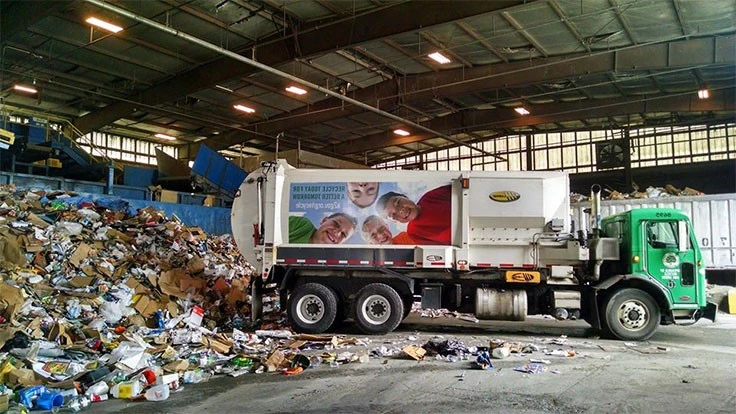
Recycle Ann Arbor
Despite city staff’s recommendation to approve a $12 million contract with Flint, Michigan-based Emterra Environmental USA to haul Ann Arbor’s recyclables to Emterra’s new single-stream material recovery facility (MRF) in Lansing, Michigan, city council recently voted for the city to work with area nonprofit Recycle Ann Arbor (RAA) to rebuild and reopen the city’s MRF.
While Emterra, the U.S. division of Canadian waste management firm Emterra Group, has 45 years of experience in collection, processing and commodities marketing and owns and operates 14 MRFs, processing 550 million tons of materials annually, the proposal to transport recyclables to the Lansing facility would result in 2.5 truckloads daily for a total of approximately 91,000 vehicle miles traveled annually, which works against the city’s Carbon Neutrality by 2030 goal.
The city closed its MRF, formerly operated by Charlotte, North Carolina-based ReCommunity, July 2016 because of safety concerns due to the condition of the equipment at the facility, the city says. Since 2017, the city has contracted with RAA to haul the city’s recyclables to Ohio-based Rumpke’s MRF in Cincinnati for processing. That contract expires on June 30, 2020.
Amid the city’s and residents’ desires to again process recyclables at the city’s MRF, the city issued a request for proposals (RFP) from interested parties to either haul the recyclables to an off-site MRF for processing or to “equip and modify the city’s MRF to receive, process and market all recyclable materials.”
“There has been a serious shortage of material recovery facility capacity in southeast Michigan and this has in part led to Michigan’s underperformance in material recovery,” says Kerrin O’Brien, president of the Michigan Recycling Coalition.
RAA offered the only bid in September 2019 to restart the Ann Arbor MRF, according to the city.
“Rebuilding the MRF would restore a $6 million publicly owned community asset with no upfront capital cost to the city,” the city reports. It would also create approximately 20 local jobs.
Despite staff concerns that RAA lacks the experience and qualifications to operate the MRF, the council directed staff to negotiate an agreement with RAA to rebuild and operate the Ann Arbor MRF for an initial period of 10 years.
“The contract will include requirements that RAA submit timely and detailed reports as required to assess performance and that the city will receive a host municipality fee for all non-city materials processed and that the city will receive the best terms offered to any other entity processing materials through the MRF,” the city’s resolution states.
RAA has 45 years of experience in curbside collections, drop-off stations and reuse and recovery centers, including a recovery yard in Ann Arbor. According to its RFP, RAA would rely heavily on subcontractors for most of the implementation and startup of the MRF. RAA’s projected timeline for the project ranges from 12 to 24 months. While some details of the project are to be determined, the nonprofit says it plans to use state grant funding, as it has for previous projects, to replace some of the equipment at the MRF.
“Restoring our capacity to sort and process recyclables locally will help ensure the highest quality end materials,” RAA reports. “As a community-based recycler, our purpose is to help Ann Arbor reach its zero waste goals.”
According to the Institute of Local Self Reliance study, “Why Local Matters,” small-scale, locally owned businesses create communities that are more prosperous, entrepreneurial, connected and generally better off across a wide range of metrics, RAA reports.
“The RAA proposal protects the city if recycling commodity values drop as they did in 2009 and again this year,” the nonprofit adds.
RAA reports that it has been awarded an $800,000 grant from the Michigan Department of Environment, Great Lakes, and Energy (EGLE) and has “secured reliable national and local private financing to rebuild the Ann Arbor MRF.”
“The funders are experts in the field of recycling and risk assessment, and they have found this proposal worthy of significant funding,” the organization says. “They have full faith in the project and in RAA and are confident about receiving a return on their investment.”
The EGLE Recycling Program supports the redevelopment of the Ann Arbor MRF.
“EGLE seeks to develop more processing capacity across the state," states Emily Freeman, EGLE recycling specialist. "RAA's MRF project scored very high in our evaluation criteria, which is why we awarded the grant to Recycle Ann Arbor."
Latest from Recycling Today
- Aqua Metals secures $1.5M loan, reports operational strides
- AF&PA urges veto of NY bill
- Aluminum Association includes recycling among 2025 policy priorities
- AISI applauds waterways spending bill
- Lux Research questions hydrogen’s transportation role
- Sonoco selling thermoformed, flexible packaging business to Toppan for $1.8B
- ReMA offers Superfund informational reports
- Hyster-Yale commits to US production





